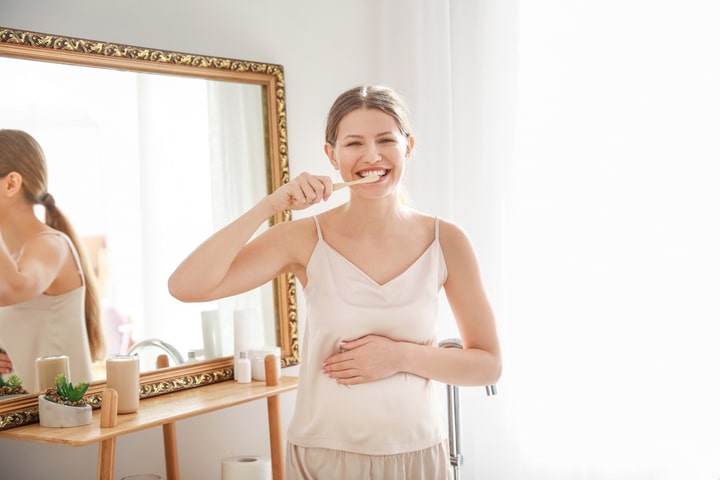
Pregnant? What an exciting time … it’s beautiful, amazing and yet also scary and overwhelming. As you embark on your pregnancy journey, it’s important to remember that your body is a cohesive and interconnected unit not a series of independent parts stuck together. For example, oral hygiene is important not only for your dental health, but also for the health of your baby. So let’s delve a little deeper into the dental issues that can occur during this exciting phase of life.
Gingivitis is the most common issue that pregnant women encounter. During pregnancy the body is on high alert with elevated levels of the hormones oestrogen and progesterone. If there is any plaque present in the mouth the gums are more likely to respond with a bit too much gusto, because of these hormones, and this in turn can lead to increased bleeding and swollen gums. Some unlucky women may even get spontaneous bleeding of the gums.
So what can you do?
It is important to maintain your dental hygiene routine at home. Brushing and flossing is crucial. I also recommend that you continue your regular dental visits and receive personalised advice if required.
Periodontitis is also known as gum disease. Periodontitis is a condition that occurs when gingivitis goes untreated. It is more severe and involves the destruction of the bone that holds your teeth in place. Recent research suggests a connection between gum disease and low birth weight or premature births. (5,6) So taking care of your gums is vital for both mum and bub.
So what can you do?
If you already have gum disease make sure you are extra vigilant with your oral hygiene at home and maintain your regular dental visits. If you experience bleeding or consider yourself high risk, it may be prudent to increase the frequency of dental visits during your pregnancy.
Pyogenic granulomas is long Latin word for basically a large, red, lumpy, enlargement of the gums, which easily bleeds. It occurs in a small percentage (1-5%) of pregnant women and is more common after the third month.
So what can you do?
Fortunately they usually disappear without any intervention. However keeping the area clean is important and in a few cases it may need to be removed after the baby is born if it hasn’t resolved on its own.
Dental Decay: You may have heard pregnant women say “the baby sapped my calcium and I had cavities after falling pregnant.” While calcium-sapping babies are a myth, an increase in caries in pregnant women may be true. Women are at a higher risk of decay during pregnancy and afterwards, not because the baby is taking their calcium but because of changes to diet (e.g. snacking and cravings) and higher acidity from reflux or vomiting.
So what can you do?
Each woman and each situation is different, so there is no one solution. I need to listen to the issues at hand before offering individualised advice, however in general terms, snacking is something the mouth can deal with, but it does have a tipping point. Any food or drink that isn’t water is considered a dental meal. So using this principle, I recommend that you don’t eat more than 5 meals a day and try to eat snacks that are protein and fibre based (e.g. cheese, celery, nuts) rather than sugars and sweets. If only sweetness cure that craving, try the low sugar option or go with natural sugars found in fresh fruits and then brush your teeth afterwards or use fluoride mouth rinse.
Erosion: Some women find that they experience a lot of reflux or vomiting during their pregnancy. As well as leaving a bad taste, the increased exposure to acid in the mouth can lead to sensitivity, decay and potentially the need for further dental work.
What can you do?
Keeping your mouth in a neutral state during pregnancy is easier said than done. Concentrate your meals and snacking as much as possible, and hydrate with water only. If you have vomited it’s best to avoid brushing your teeth straight away, instead rinse your mouth with a fluoride rinse. Alternatively you can make a rinse at home for your mouth by adding 1/4 teaspoon of sodium bicarbonate or baking soda to one cup of water. Brushing is still advisable but thirty minutes after rinsing. Chewing sugar free gum can also be beneficial but these gums can be harder to source in Singapore.
Retching: Retching or gagging can make the very idea of brushing overwhelming.
What can you do?
I recommend using a very small brush head (even try a child’s toothbrush if you need to). Avoid frothy toothpaste. Slow down and take your time. Close your eyes and concentrate on your breathing. Distractions such as music can also be beneficial.
Finally, is dentistry safe while pregnant? There is a common misconception that dentistry is something that should be avoided while pregnant. In fact, the very opposite is true and extra attention should be given to dental hygiene at this time. Remember, ensuring your teeth and gums are healthy is vital in making sure your baby is healthy also. The American Dental Association and the American Congress of Obstetricians and Gynaecologists agree that treatments such as extractions and root canals can be safely performed during pregnancy. Therefore you should continue your normal dental visits during your pregnancy. As always, care and effort are made to ensure that every woman is looked after according to her specific needs and concerns.
 Dr Teodora Kent is an Australian trained dentist based at Smilefocus.
Dr Teodora Kent is an Australian trained dentist based at Smilefocus.
Call 6733 9882 to make an appointment
